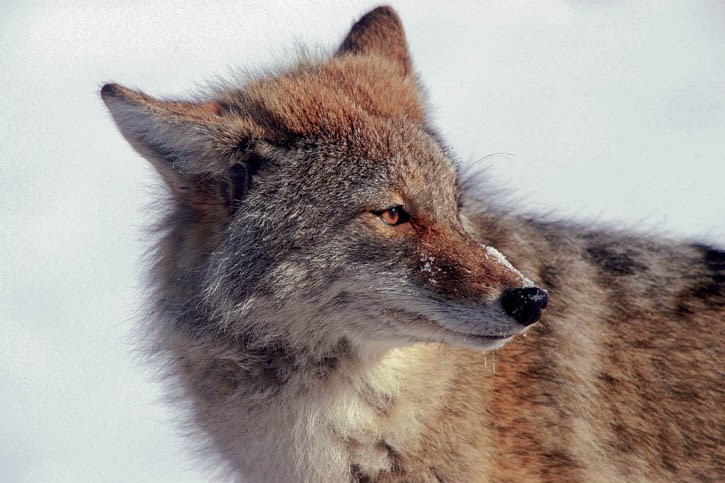BANFF – Learning to live with wildlife is playing out in a Banff backyard where a coyote family is denning.
After a coyote pair was discovered denning under a shed in a large residential backyard on the periphery of the Banff townsite in May, the Parks Canada wildlife team decided to carefully manage the situation rather than push the animals out or relocate them.
“We spoke with the homeowner to ensure they were comfortable with the situation and explain what we could expect. Often, the females give birth shortly after accessing their den,” said Dan Rafla, a human-wildlife coexistence specialist for Banff National Park.
“Once the pups are underneath in their den, we’re not going to actively manage those animals if we can avoid it, providing there’s no unreasonable risk to the public, which there was none in this case.”
The denning coyote pair produced seven pups.
Coyote parents can behave more boldly during the denning and pup rearing stage as they try to keep their families safe.
Their activity levels and protectiveness rise even more as the pups begin to wander out of the den.
This could look like ‘escorting’ people and dogs away from their dens and standing their ground, or acting more defensively if they perceive a threat.
While coyotes are rarely interested in people, they may view larger dogs as competition or a threat, and smaller dogs may be seen more as potential prey for them.
Rafla said there have been a small number of reports over the past few weeks of coyotes escorting dogs.
“There was no contact. They would be in the general area but closing the gap, and as soon as the person walking the dog was aware of it, the coyote ran off,” he said.
“It’s almost like they don’t see you; they are focusing on the dog. It’s very instinctual, canid to canid.”
While most residents in the neighbourhood were aware of the denning coyote family, an official warning did go into effect on June 18 following an incident in which a coyote nipped at a dog.
Again, the coyote took off as soon as the resident scared it away.
The area where special caution is recommended when travelling is the southeast side of town including Glen Avenue, Mountain Avenue, Mountain Lane, Kootenay Avenue and Spring Crescent.
“The dog was startled, but an inspection of where that nip occurred, showed no skin was punctured,” Rafla said.
“It was really like a warning from the coyote…this is not unusual behaviour for this time of year.”
Coyotes co-parent and share in the rearing of pups, which need to learn all of the appropriate survival life skills.
As pups become more independent, both parents may venture off to hunt and forage, leaving the pups behind in the den area or at safe and secure rendezvous sites.
“The pups are now mobile and they are starting to leave the den site, but they are not yet big enough to move any great distance, so it’s sort of like a period of anxiety for the parents,” Rafla said.
“Not only are they feeding these pups and taking care of them, but like a human child, they can kind of walk and they’re touching everything and getting into trouble, but they’re still really vulnerable.”
The wildlife team expects the coyote family will move out of the area over the next week or two to a secondary den site or a transitory cache site given the seven pups are getting bigger and the town is getting busier.
“When we start seeing that defensive behaviour it’s also because they’re getting disturbed,” Rafla said.
“They’re probably going to think this isn’t a great place anymore and will probably go somewhere else," he added.
"By mid-July, the parents will be much more comfortable at that stage because the pups can somewhat take care of themselves.”
The Bow Valley Naturalists were pleased to see Parks Canada and the Banff homeowner embrace the concept of coexistence in this case.
“We live in nature’s backyard,” said Reg Bunyan, the group’s vice-president.
“If we choose to live in harmony with our environment, then that choice entails taking a certain amount of physical risk and inconvenience.”
Once the coyote family leaves the den site, Parks Canada will work with the homeowner to seal the den underneath the backyard shed so it won’t get reused in future.
“We’ll manage it this time, but we want to avoid having coyotes denning in town,” Rafla said.
In 2020, a bold coyote had been approaching dogs at close range. At the time, it was suspected it was trying to stake out territory or defend a den. In spring 2018, a coyote family denned under a deck on Glen Avenue.
Parks Canada reminds residents and visitors that safe practices such as keeping all food, garbage and dog food secured inside accommodations or vehicles.
In addition, it is the law to keep dogs on a leash.
“If you see a coyote, make sure you’re strong and assertive,” Rafla said.
“It’s probably because the pups are close and it’s probably going to resolve itself.”
Parks Canada asks that all coyote sightings be reported immediately to Banff National Park dispatch at 403-762-1470.




